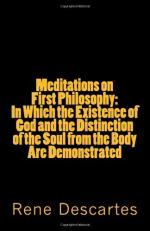Sect. V. Noble Comparisons proving that Nature shows the Existence of its Maker. First Comparison, drawn from Homer’s “Iliad.”
Who will believe that so perfect a poem as Homer’s “Iliad” was not the product of the genius of a great poet, and that the letters of the alphabet, being confusedly jumbled and mixed, were by chance, as it were by the cast of a pair of dice, brought together in such an order as is necessary to describe, in verses full of harmony and variety, so many great events; to place and connect them so well together; to paint every object with all its most graceful, most noble, and most affecting attendants; in short, to make every person speak according to his character in so natural and so forcible a manner? Let people argue and subtilise upon the matter as much as they please, yet they never will persuade a man of sense that the “Iliad” was the mere result of chance. Cicero said the same in relation to Ennius’s “Annals;” adding that chance could never make one single verse, much less a whole poem. How then can a man of sense be induced to believe, with respect to the universe, a work beyond contradiction more wonderful than the “Iliad,” what his reason will never suffer him to believe in relation to that poem? Let us attend another comparison, which we owe to St. Gregory Nazianzenus.
Sect. VI. Second Comparison, drawn from the Sound of Instruments.
If we heard in a room, from behind a curtain, a soft and harmonious instrument, should we believe that chance, without the help of any human hand, could have formed such an instrument? Should we say that the strings of a violin, for instance, had of their own accord ranged and extended themselves on a wooden frame, whose several parts had glued themselves together to form a cavity with regular apertures? Should we maintain that the bow formed without art should be pushed by the wind to touch every string so variously, and with such nice justness? What rational man could seriously entertain a doubt whether a human hand touched such an instrument with so much harmony? Would he not cry out, “It is a masterly hand that plays upon it?” Let us proceed to inculcate the same truth.
Sect. VII. Third Comparison, drawn from a Statue.
If a man should find in a desert island a fine statue of marble, he would undoubtedly immediately say, “Sure, there have been men here formerly; I perceive the workmanship of a skilful statuary; I admire with what niceness he has proportioned all the limbs of this body, in order to give them so much beauty, gracefulness, majesty, life, tenderness, motion, and action!”




